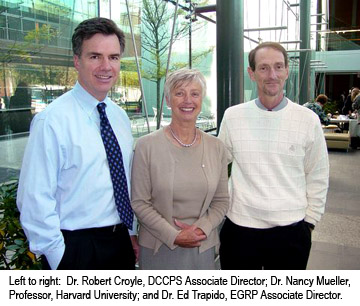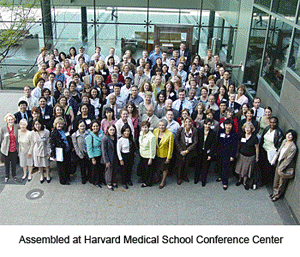EGRP Hosts Workshop on Understudied Rare Cancers
(co-sponsored with the NIH Office of Rare Diseases)
 |
 |
|

The Epidemiology and Genetics Research Program (EGRP) sponsored its second leadership workshop bringing together investigators to identify ways to stimulate research on understudied rare cancers on September 11-13, 2005, in Boston. EGRP is responsible for managing NCI's extramural epidemiology research portfolio. View meeting agenda.
EGRP-funded investigators conducting research on understudied rare
cancers were invited to the workshop to identify gaps in epidemiologic
and genetic research on the cancers, and to discuss ways to foster
collaborations and partnerships among basic, clinical, and population
scientists within the extramural and intramural communities. The
National Institutes of Health's Office
of Rare Diseases also
cosponsored the workshop.
also
cosponsored the workshop.
"The four major cancers, lung, breast, prostate, and colorectal cancer, comprise the lion's share of our portfolio, but there are other cancers – some of them highly lethal – that need more study," said Ed Trapido, Sc.D., EGRP Associate Director. "We sought the help of our investigators to identify the gaps and stumbling blocks and suggest new approaches to move forward epidemiologic research on these diseases."

Focus of Workshop
The workshop focused on cancers of the brain, eye, oral cavity,
pharynx, head, neck, endometrium, ovary, testis, digestive and urinary
systems, larynx, bones, joints, soft tissues, thyroid, and other
cancers of the endocrine systems, non-Hodgkin's lymphoma, Hodgkin's
disease, leukemia, myeloma, and Kaposi's sarcoma. Pancreatic cancer
was excluded because it is addressed in a trans-NCI Program Announcement
that EGRP currently is cosponsoring (PA for Pilot Studies in Pancreatic
Cancer (PA
05-116 )).
)).
Nancy Mueller, Sc.D., of Harvard University and Dana-Farber Cancer Institute, gave the keynote address on lessons that she has learned in studying Hodgkin's lymphoma over the past 30 years. Dr. Mueller has been an EGRP grantee for 28 years. She has found the research experience richly rewarding but spoke of times when funding for epidemiologic research was a problem, and there were few advocates for such research, few epidemiologists with whom to share data, and few basic scientists interested in collaboration. The reward of rare cancer research lies in the opportunity to make a difference, she said. "It's really a labor of love...you do it because you care."
Consortia and Transdisciplinary Science
Working groups discussed advancing research on understudied rare cancers in the context of consortia and transdisciplinary science. The consortia approach is an emerging paradigm in which large interdisciplinary teams of scientists think and work collaboratively using common questions, protocols and methods, and perform coordinated parallel or pooled analyses. EGRP currently is supporting or assisting in the development of epidemiological research consortia on 15 types of cancer. Technology and team science are changing the landscape of research, said Dr. Trapido.
A panel chaired by Robert Croyle, Ph.D., Director, Division of Cancer Control and Population Sciences (DCCPS), of which EGRP is a part, described some of the resources and potential opportunities for collaboration or partnership that are available through the Division. DCCPS supports extramural initiatives in cancer surveillance, quality of care, tobacco control, behavioral research, energy balance, survivorship, health disparities, and in the dissemination and diffusion of new knowledge, as well as epidemiology.
Cancer advocates also spoke on the role of epidemiology in the life of cancer survivors and how they may be helpful to investigators. This panel was chaired by DCCPS' Julia Rowland, Ph.D., Director, Office of Cancer Survivorship, and included Douglas Bank, of the Testicular Cancer Resource Center; Richard Boyajian, R.N., M.S., of the Lance Armstrong Foundation Adult Survivorship Clinic, Dana-Farber Cancer Institute; and Cary Zahrbock, of the National Coalition for Cancer Survivorship.
Themes To Emerge
Four major themes emerged from the workshop discussions. The investigators expressed the need for: (1) improvements to the review process for rare cancer proposals, (2) targeted funding for rare cancers; (3) suggestions for promoting formation of consortia, and (4) exploration of the potential usefulness of greater involvement of cancer registries in research.
EGRP plans to use the information gathered from the workshop to prioritize funding mechanisms, develop new initiatives, and to discuss review issues with appropriate National Institutes of Health (NIH) staff. The summary from The 2nd Epidemiology Leadership Workshop: Understudied Rare Cancers are available on this Web site. Included are talks on design issues in the study of rare cancers, creating consortia, transdisciplinary science, and DCCPS resources and opportunities.
Also on EGRP's Web site is the report from The 1st NCI Epidemiology Leadership Workshop, which was held in 2004 to identify barriers and gaps in cancer epidemiology and advance solutions to studying tobacco, diet/energy balance, and genes.


